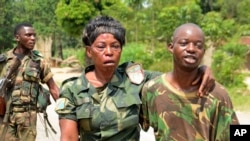“To grow up as a child in Congo, according to God’s will, is to grow up in paradise,” Col. Mamadou Ndala says in the opening scenes of “This Is Congo,” a film making its theatrical release Friday in the United States.
Strolling outside the eastern city of Goma where he is stationed, Ndala adds: “Perhaps because of the will of man, growing up in Congo is to grow up in misery because of these endless, unjust wars imposed on the people.”
Congo has been in the headlines as it faces its latest outbreak of the deadly Ebola virus, and as a long-delayed presidential election is set for December. Dozens of armed groups continue to wreak deadly havoc on the vast, mineral-rich nation.
“This Is Congo,” directed and filmed by former photojournalist Daniel McCabe, gives an insider’s view on the diverse lives behind the headlines. It follows four people — a military commander, a mineral dealer, a tailor and a high-ranking, anonymous military intelligence officer — to show the humanity in the middle of crisis.
Traveling around the Kivu regions in the east, McCabe sought to explore the root causes of conflict in Congo. He ended up on the front lines of fighting between the army and M23 rebels as they marched into Goma in 2012 and were pushed out the following year. He gained unprecedented access through Ndala, the film’s main subject.
Though filming mostly took place in 2012 and 2013 the scenes of fighting appear timeless, reflecting Congo’s continuous upheaval as some soldiers are recruited by ever-changing rebel groups and later reintegrated back into the army, which is poorly organized and badly paid.
“This is a revolving cycle of conflict,” McCabe told The Associated Press. “The film to me is about the banality of war and the corruption of man. Our hope is that the audience can identify with the characters.”
Another of the four main characters is Mama Romance, who turned to selling gemstones to support her family, eventually sending her children to good schools and breaking the cycle of poverty. The dangerous work, as she crosses borders to sell, shows how entrepreneurial Congolese make money from the rich mineral resources around them. Often the proceeds from exports never trickle down.
“This Congo” also follows Hakiza Nyantaba, a tailor who has been displaced for years by conflict, as he ekes out a life at the kind of camp that is home to many Congolese. As of January 4.5 million people had been displaced, according to the United Nations refugee agency.
“It seems God has forgotten us,” Nyantaba says.
McCabe honors his resilience.
“There are displacement camps where people have been living for 20 years. It’s unfathomable,” the filmmaker said.
Alleged corruption by officials and mining companies in part drives the fighting in Congo, which has trillions of dollars of mineral deposits ranging from diamonds and zinc to copper and tin.
“This is Congo” makes clear that civilians are the victims.
McCabe, who clearly adores the complexities of Congo, said he wants the film’s viewers to “dig up more information on their own . read more books, have more interest in the area.” He urged people to “broaden their gaze.”
The film premiered in September at the Venice Film Festival but will release on Friday in theaters in New York City, Los Angeles and other U.S. cities. It also is being released on the BBC in the UK on iTunes in more than 70 countries.
“This is Congo” also will screen in Goma on July 15 on the closing night of the Congo International Film Festival.




